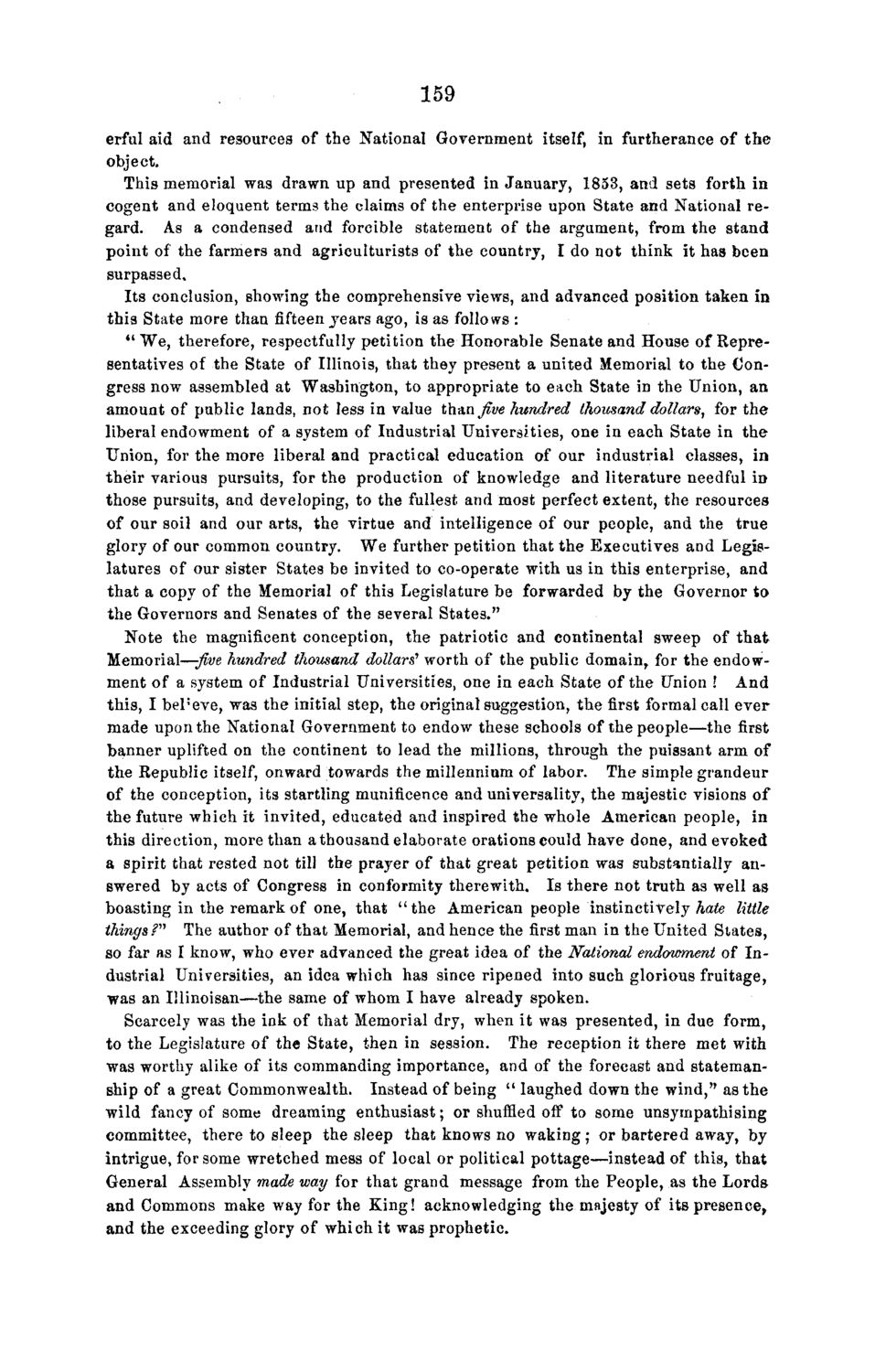| |
| |
Caption: Board of Trustees Minutes - 1868
This is a reduced-resolution page image for fast online browsing.

EXTRACTED TEXT FROM PAGE:
159 erful aid and resources of the National Government itself, in furtherance of the object. This memorial was drawn up and presented in January, 1853, and sets forth in cogent and eloquent term3 the claims of the enterprise upon State and National regard. As a condensed and forcible statement of the argument, from the stand point of the farmers and agriculturists of the country, I do not think it has been surpassed. Its conclusion, showing the comprehensive views, and advanced position taken in this State more than fifteen years ago, is as follows : " W e , therefore, respectfully petition the Honorable Senate and House of Representatives of the State of Illinois, that they present a united Memorial to the Congress now assembled at Washington, to appropriate to each State in the Union, an amount of public lands, not less in value th&nfivehundred thousand dollars, for the liberal endowment of a system of Industrial Universities, one in each State in the Union, for the more liberal and practical education of our industrial classes, in their various pursuits, for the production of knowledge and literature needful in those pursuits, and developing, to the fullest and most perfect extent, the resources of our soil and our arts, the virtue and intelligence of our people, and the true glory of our common country. We further petition that the Executives and Legislatures of our sister States be invited to co-operate with us in this enterprise, and that a copy of the Memorial of this Legislature be forwarded by the Governor to the Governors and Senates of the several States." Note the magnificent conception, the patriotic and continental sweep of that Memorial—-five hundred thousand dollars' worth of the public domain, for the endowment of a system of Industrial Universities, one in each State of the Union ! And this, I believe, was the initial step, the original suggestion, the first formal call ever made upon the National Government to endow these schools of the people—the first banner uplifted on the continent to lead the millions, through the puissant arm of the Republic itself, onward towards the millennium of labor. The simple grandeur of the conception, its startling munificence and universality, the majestic visions of the future which it invited, educated and inspired the whole American people, in this direction, more than a thousand elaborate orations could have done, and evoked a spirit that rested not till the prayer of that great petition was substantially answered by acts of Congress in conformity therewith. Is there not truth as well as boasting in the remark of one, that " t h e American people instinctively hate little things?" The author of that Memorial, and hence the first man in the United States, so far as I know, who ever advanced the great idea of the National endowment of Industrial Universities, an idea which has since ripened into such glorious fruitage, was an Illinoisan—the same of whom I have already spoken. Scarcely was the ink of that Memorial dry, when it was presented, in due form, to the Legislature of the State, then in session. The reception it there met with was worthy alike of its commanding importance, and of the forecast and statemanship of a great Commonwealth. Instead of being " laughed down the wind," as the wild fancy of some dreaming enthusiast; or shuffled off to some unsympathising committee, there to sleep the sleep that knows no waking ; or bartered away, by intrigue, for some wretched mess of local or political pottage—instead of this, that General Assembly made way for that grand message from the People, as the Lords and Commons make way for the King! acknowledging the majesty of its presence, and the exceeding glory of which it was prophetic.
| |